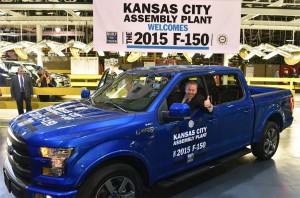
Ford President Joe Hinrichs was thumbs up earlier this year and has reason to be now as the automaker and UAW averted a strike at the Kansas City plant.
Ford Motor Co. has avoided a strike at a critical truck plant by settling on the local issues at the Kansas City Truck plant where the United Auto Workers had authorized a walkout if talks failed.
The two sides, which beat a looming deadline by two days, were haggling over issues regarding safety, seniority and manpower at the 4-million-square-foot plant. The plant produces the maker’s hot-selling F-150 as well as its Transit van and a strike could have been very costly.
Meanwhile, the union was still mulling over its next move, following the decisive rejection of a tentative agreement negotiated last month with FCA U.S. Almost two thirds of the maker’s 40,000 unionized employees voted against the proposed deal. It was by far the biggest vote against a contract that did not include major concessions in 30 years.
The union’s executive board, which was stunned by the intense social media campaign aimed at blocking ratification, appears to leaning towards returning to FCA U.S. for another round of discussions rather than move on to General Motors or Ford.
However, local union leaders told UAW President Dennis Williams that several items needed to change for the agreement to be more acceptable to restive members, who were also registering a major protest against the often FCA U.S. Sergio Marchionne’s high-handed management style.
The list of key issues emerged local union leaders said needed to be addressed included the re-instatement of the contract language that would limit the number of second-tier workers to 25% of the total work force.
The so-called 25% cap will clear the way for hundreds of workers to move up to higher paying first tier wages, something Marchionne has clearly opposed. In addition, workers also want clear path from the lower wages of the second tier to the higher wages paid workers on tier one, which now stand at $28 per hour.
(UAW workers reject FCA contract. For more, Click Here.)
First-tier workers also want a raise larger than the 2% pay increase included in the rejected contract. Workers also want changes in the “alternative work schedule” pushed by Marchionne and his top lieutenants.
Local union leaders also have object to Marchionne’s plans to move all of the company’s passenger car production to Mexico.
Williams and other union officials tried to blunt the impact of Marchionne’s comments about moving production of the Jeep Cherokee from the Toledo complex and other moves that would have changed the production at FCA’s three assembly plants in and around Detroit.
Workers were also deeply skeptical about the so-called health-care co-op that Williams maintained was designed to help blunt the impact of swiftly rising health care costs without cutting benefits.
(Click Here for more details about the now-rejected deal between FCA and the UAW.)
For its part, FCA U.S. has said it was willing to re-open discussions with the union in an effort to salvage the advantage gained from being the UAW’s primary target.
FCA appears to have made the case that it should not have to accept the richer contract that the union could negotiate with General Motors or Ford.
The union did clear the way for wider discussions with Ford by settling a critical contract at the automaker’s big assembly plant in Kansas City, Missouri. The union had set a strike deadline at the plant for Sunday night. The settlement, however, averted a strike and opened the way to more intensive discussion with Ford should the UAW decide to put the talks at Chrysler on hold.
Mary Barra, GM’s chief executive officer, said last week the rejection of the FCA U.S. would have no impact on the company’s discussion with the UAW.
(For more on the apparent impasse at the Ford F-150 plant, Click Here.)
The UAW also eliminated one potential distraction over the weekend with the ratification of a new contract for some 10,000 workers at Deere & Co., the big manufacturer of farm equipment.

